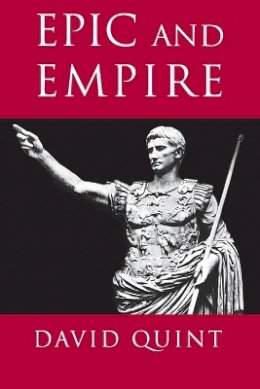
Stock image for illustration purposes only - book cover, edition or condition may vary.
Description for Epic and Empire
Paperback. Explores the political context and meanings of key works in Western literature. This book covers Virgilian epics of conquest and empire that take the victors' side (the "Aeneid" itself, Camoes's "Lusiadas", Tasso's "Gerusalemme liberata") and the countervailing epic of the defeated and of republican liberty. Series: Literature in History. Num Pages: 448 pages, 1 fig. BIC Classification: DSC. Category: (P) Professional & Vocational; (U) Tertiary Education (US: College). Dimension: 236 x 162 x 27. Weight in Grams: 656.
Alexander the Great, according to Plutarch, carried on his campaigns a copy of the Iliad, kept alongside a dagger; on a more pronounced ideological level, ancient Romans looked to the Aeneid as an argument for imperialism. In this major reinterpretation of epic poetry beginning with Virgil, David Quint explores the political context and meanings of key works in Western literature. He divides the history of the genre into two political traditions: the Virgilian epics of conquest and empire that take the victors' side (the Aeneid itself, Camoes's Lusiadas, Tasso's Gerusalemme liberata) and the countervailing epic of the defeated and of republican liberty (Lucan's Pharsalia, Ercilla's Araucana, and d'Aubigne's Les tragiques). These traditions produce opposing ideas of historical narrative: a linear, teleological narrative that belongs to the imperial conquerors, and an episodic and open-ended narrative identified with "romance," the story told of and by the defeated. Quint situates Paradise Lost and Paradise Regained within these rival traditions. He extends his political analysis to the scholarly revival of medieval epic in the late eighteenth and nineteenth centuries and to Sergei Eisenstein's epic film, Alexander Nevsky. Attending both to the topical contexts of individual poems and to the larger historical development of the epic genre, Epic and Empire provides new models for exploring the relationship between ideology and literary form.
Product Details
Format
Paperback
Publication date
1993
Publisher
Princeton University Press United States
Number of pages
448
Condition
New
Series
Literature in History
Number of Pages
448
Place of Publication
New Jersey, United States
ISBN
9780691015200
SKU
V9780691015200
Shipping Time
Usually ships in 7 to 11 working days
Ref
99-1
About David Quint
David Quint is Professor of English and Comparative Literature at Yale University. He is the author of Origin and Originality in Renaissance Literature (Yale) and The Stanze of Angelo Poliziano (Massachusetts).
Reviews for Epic and Empire
